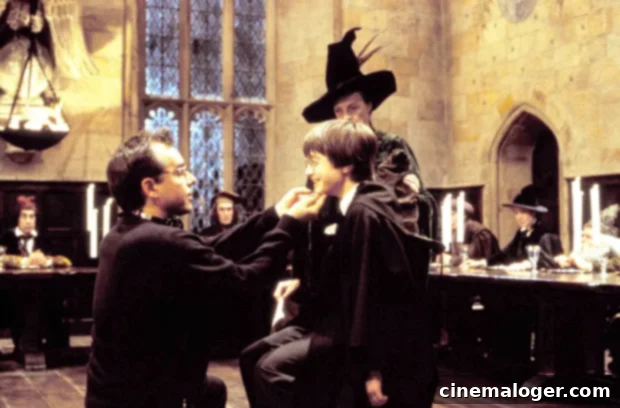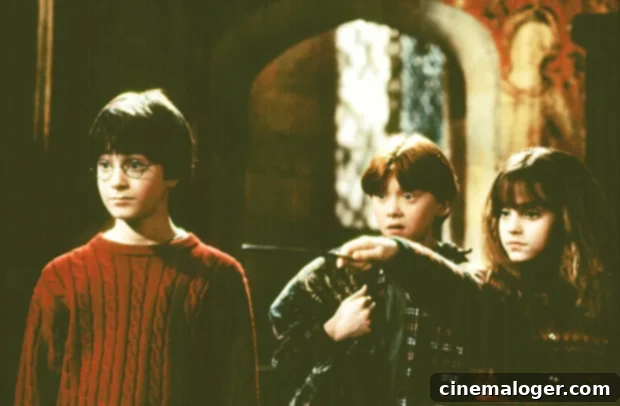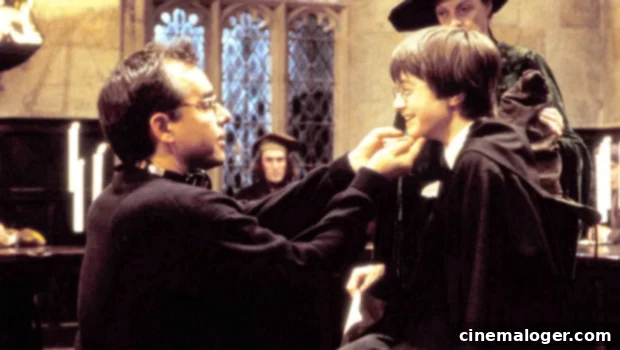Harry Potter’s Timeless Magic: Chris Columbus on 20 Years, “Cursed Child,” and Future Visions
It feels almost miraculous to realize that two decades have passed since the cinematic debut of Harry Potter and the Sorcerer’s Stone (known internationally as Harry Potter and the Philosopher’s Stone). The world was introduced to the magical trio – young Daniel Radcliffe, Emma Watson, and Rupert Grint – who brought Harry, Hermione, and Ron to life on the big screen. To steer this monumental adaptation of J.K. Rowling’s beloved book, Warner Bros. turned to a seasoned filmmaker with a knack for capturing childhood wonder and heart: Chris Columbus. With an impressive directorial resume already boasting classics like Home Alone and Mrs. Doubtfire, Columbus was the ideal choice to shepherd the nascent global phenomenon. Under his meticulous guidance for the first two films, the Wizarding World was flawlessly brought to life, laying the foundational magic for one of the most successful film franchises in history.
Twenty years later, the enchanting story of Harry Potter continues to thrive, captivating new generations of fans. As the franchise evolves beyond its original seven books, questions naturally arise about its future, and particularly, about Chris Columbus’s potential involvement. One of the most talked-about possibilities is the stage play, Harry Potter and the Cursed Child, making its way to the silver screen. Columbus has openly expressed his keen interest in this project, signaling his readiness to return to the director’s chair should the opportunity arise to bring the continuation of Harry’s story to cinematic life.

During an exclusive interview, Chris Columbus candidly shared his vision: “I still fantasize about directing Harry Potter and the Cursed Child with the original cast.” This sentiment resonates deeply with dedicated fans, who yearn to see Daniel Radcliffe, Emma Watson, and Rupert Grint reprise their iconic roles as adult versions of Harry, Hermione, and Ron. Columbus elaborated on the profound appeal, stating, “I think it would be, from a nostalgic point of view and also from a fans point of view, a thrill to see our actors at their ages now playing these roles. There is just something touching about that.” He drew a parallel to the wildly successful return of the original cast in the recent *Star Wars* sequel trilogy, highlighting the potent emotional connection that legacy actors bring to beloved franchises. “It is kind of like what J.J. [Abrams] did with Star Wars and why that was so wonderful.” The prospect of witnessing the original trio, now seasoned and mature, tackle the complexities of their characters’ adult lives, promises a powerful blend of nostalgia and fresh storytelling that could reignite the global fascination with the Wizarding World in a truly unique way.
Shifting gears to another sci-fi juggernaut, the conversation naturally turned to *Star Wars* and its creator, George Lucas. Decades after the original trilogy’s release, Lucas famously revisited his films, remastering them with improved CGI and incorporating expanded scenes that were technically impossible during their initial production. This historical precedent immediately brings to mind Chris Columbus’s own past admission that he felt “rushed” with the visual effects in the very first Harry Potter movie. Given the incredible advancements in VFX technology over the past two decades, from the rudimentary CGI of the early 2000s to today’s breathtaking photorealism, the question arose: would Columbus ever consider going back to enhance Sorcerer’s Stone?
Columbus readily admitted the temptation: “I would love to do it.” He pointed to a specific sequence that still lingers in his mind as a missed opportunity for perfection: “There is a part of me that particularly wants to get back into the Quidditch match, which we didn’t have enough time in visual effects to finish properly.” The Quidditch scenes, a staple of the Wizarding World, were a monumental undertaking for the visual effects teams of the time. Improving these sequences with modern technology could undoubtedly elevate the spectacle for a contemporary audience. However, after a thoughtful pause, Columbus added a crucial caveat: “So, I would like to go back and dabble with that a little bit but there is that thing where, ‘Do you mess with people’s memories?’ You don’t want to do that either.” This insightful reflection highlights the delicate balance between artistic vision and fan reverence. While technological improvements offer enticing possibilities, the intrinsic value of a film, as it was originally experienced and cherished, holds immense weight. Altering a beloved classic, even with the best intentions, risks alienating the very fans who hold those original memories so dear, as proven by the divisive reactions to Lucas’s various *Star Wars* special editions.

With the cinematic adaptation of Cursed Child still an uncertain prospect, and a remaster of Sorcerer’s Stone deemed unlikely due to the “memory” dilemma, could Chris Columbus potentially lend his directorial talents to another corner of the expansive Wizarding World? For many ardent Harry Potter fans, the ultimate dream project is a film centered on the Marauders. For those who might not be intimately familiar with the deeper lore, the Marauders were a quartet of legendary Hogwarts students during their school days: Remus Lupin, Peter Pettigrew, Sirius Black, and James Potter. They were the ingenious creators of the infamous Marauder’s Map, a magical artifact that played a crucial role in Harry’s adventures. A Marauders movie would delve into their formative years at Hogwarts, exploring their complex friendships, rivalries, the invention of the map, and the origins of their animagus forms, culminating in the tragic events leading up to Voldemort’s first rise. The narrative potential for a rich, character-driven prequel is immense, offering a glimpse into a pivotal era of magical history. The burning question among fans is whether Chris Columbus, with his profound understanding of the Wizarding World’s cinematic language, would be the ideal visionary to bring this cherished fan-favorite concept to life on the big screen.
When posed with the idea of a Marauders film, Columbus’s response was measured, reflecting a director’s deep attachment to the characters he first brought to life. “It depends on what would be written,” he stated, emphasizing the paramount importance of a compelling script. However, he then revealed a personal connection that might make such a project challenging for him: “I personally have a difficult time responding to any other characters besides Harry, Hermione, and Ron, and particularly Harry, because that was my gateway into the movie in terms of how I was going to tell the story, through Harry’s point of view.” This insight underscores the unique bond a director forms with their protagonists, especially when they’re responsible for introducing them to a global audience. Columbus’s approach to the first film was meticulously crafted to align with Harry’s perspective, guiding the audience through the wonders and dangers of the magical world as Harry discovered them. While he deeply respects the broader Wizarding World, stepping outside the narrative lens of the Golden Trio would represent a significant shift for him, requiring a story and characters that could equally capture his creative imagination and passion. This doesn’t entirely close the door on a Marauders film, but it certainly suggests that for Chris Columbus, the emotional core of the Harry Potter saga will always reside with its iconic young heroes, Harry, Hermione, and Ron.
As the magic of *Harry Potter* continues its global enchantment, Chris Columbus’s reflections offer a fascinating look into the past, present, and potential future of the beloved franchise. From the nostalgic allure of reuniting the original cast for *The Cursed Child* to the ethical considerations of modernizing classic visual effects, and the perennial fan demand for stories like the Marauders, his insights underscore the enduring power of these characters and their world. Whether through new directorial endeavors or the continued appreciation of his foundational work, Columbus’s legacy as the director who first opened the gates to Hogwarts remains indelible, ensuring that the magic he helped create will continue to inspire and entertain for generations to come.
